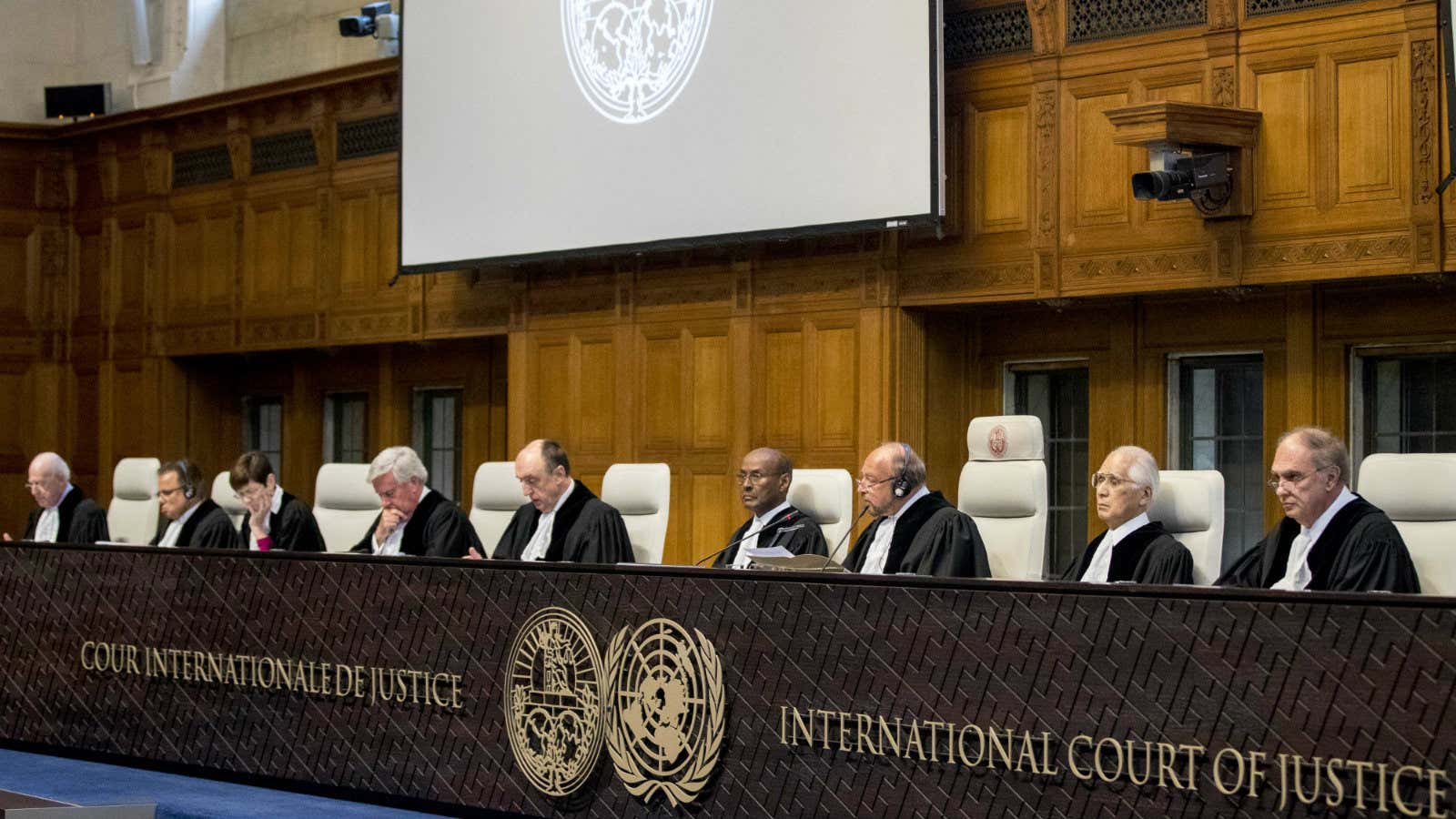For the first time in the court’s history, the UK will not have a judge sitting at the International Court of Justice (ICJ). Christopher Greenwood, who was seeking a second nine-year term, pulled out of the race on Nov. 20, allowing India’s candidate to take the contested seat. This follows weeks of conflict and tension, with a sizeable majority of the UN General Assembly having voted in favour of judge Dalveer Bhandari. The situation reveals a lot about the internal politics of the UN—because it was politics, not candidate suitability, that determined this recent election.
The UK is one of the five permanent members of the UN Security Council, and that group—the “P5”—has held a vice-like grip on power throughout the UN’s seven decades of existence. The ICJ election is one of the few ways in which the full UN membership has an opportunity to express its dissatisfaction with P5 dominance at the UN; and what is clear is that the dissatisfaction and frustration runs deep.
The problem lies in the fact that the P5—China, France, Russia, UK, and US—insisted on exceptional powers at the time that the UN was created. The failure of the League of Nations had led to World War II, and those countries that led the defeat of Nazi Germany insisted that they shape the United Nations in such a way as to be able to stop a third world war. The key way in which those countries could ensure that such an aim was met was by holding permanent seats and veto powers at the Security Council, the body given the task of and necessary powers to ensure international peace and security.
But P5 power extends far beyond just the Security Council. The convention of all P5 members having judges sitting at the ICJ has only one previous exception (China, 1967-1985). Until 2006, when the main human rights body was reformed and membership rules changed, the P5 held de facto permanent seats, as they continue to do at the Economic and Social Council (ECOSOC). And there are many political and expert bodies where P5 dominance is felt in the room even where membership is for fixed, non-renewable terms.
And P5 dominance is not limited to places where states are represented by diplomats. The UN Secretary-General appoints Under-Secretaries General and Assistant-Secretaries General to head key departments and office. P5 countries have traditionally made it clear which bodies they wish to be headed by their nationals.
The US continues to try to ensure that one of its nationals is appointed to head the Department for Political Affairs, a post previously filled by a UK national until the UK took the lead on Humanitarian Affairs. France traditionally leads on Peacekeeping Operations, and Russia recently ensured that its former ambassador to the UN was appointed to head the newly-formed Counter-Terrorism office. Of course, formally those positions are political appointments by the Secretary-General—and António Guterres has indicated that he may well change the staus quo in this regard. But there are significant grumblings about how the areas with the most clout and reach remain in the hands of P5 nationals.
P5 dominance reflected the geopolitical landscape in 1945, but the reality today is that two of those members, France and the UK, can no longer claim to be amongst the most powerful countries economically, militarily, or politically. Russia, similarly, cannot claim to compete economically or politically with the likes of Germany, Japan, Brazil, and India, although it continues to use its military force internationally in a manner long abandoned by France and the UK.
Therefore, calls to reform the Security Council to reflect today’s global landscape have grown louder with every passing year. And given the near impossibility of reforming P5 powers enshrined in the Charter, as they are able simply to veto such changes, large parts of the UN membership have sought otherwise to force changes and reforms wherever possible. Elections are one central way of achieving that aim.
Let us be clear, this election was not about who was the more expert judge; but appointments of independent experts at the UN frequently centre as much on politics as they do on qualifications for the role. Both candidates are excellent and highly-qualified. But this election was about nationality, and represents frustration, protest, and calls for change. And it is likely that other P5 states will face similar challenges to their de facto power in similar elections.
And while there is a need to heed those calls for change, it is unlikely that much will change in practice for some time. It is a great shame for international law and justice that this election was decided for political reasons.
Rosa Freedman, professor of law, conflict and global development, University of Reading. This article was originally published on The Conversation. Read the original article. We welcome your comments at ideas.india@qz.com.
